Renting in Canada
August 7, 2013 By Rochelle Johannson
 Print This Post
Print This Post
Deposits and Fees
There are a wide variety of deposits and fees charged by landlords across Canada. Sometimes they are refundable (key fees), sometimes non-refundable (pet fees), sometimes only used for one specific thing (last month rent), sometimes charged only if the tenant breaches (late rent fee or NSF fee). Most provinces allow for landlords to charge a security deposit, which is also called a damage deposit.
Essentially, a security deposit is money that the tenant pays to the landlord, on condition that it will be returned if certain things are done. When the landlord receives the money, they are usually required to protect this money somehow, usually by putting it in a trust account. In New Brunswick, the landlord pays the security deposit amount to the Office of the Rentalsman, who then holds the money until the tenant moves out. Regardless of where the money is held, when the tenancy is over, the landlord can use this money, or apply to use this money, to cover expenses that the landlord has incurred because of the actions of the tenant. Common reasons why a landlord would be allowed to keep the money are to cover damages beyond normal wear and tear to the property; last month’s rent (if last month rent has not been collected through a rent deposit); and any other fees that the tenant still owes.
With regard to the last month’s rent, in Ontario, the law allows the landlord to collect a rent deposit, but not a damage deposit. This means that the landlord can only use the deposit collected to cover unpaid rent of the tenant. If there are damages to the unit that the tenant is responsible for paying, then the landlord would have to make an application against the tenant to collect those funds.
When there are any fees or deposits, the landlord and the tenant should both know:
- the amount of the deposit or fee that is going to be charged;
- if it’s refundable or non-refundable;
- the reason the deposit is being collected; and
- what specifically the deposit can be used for.
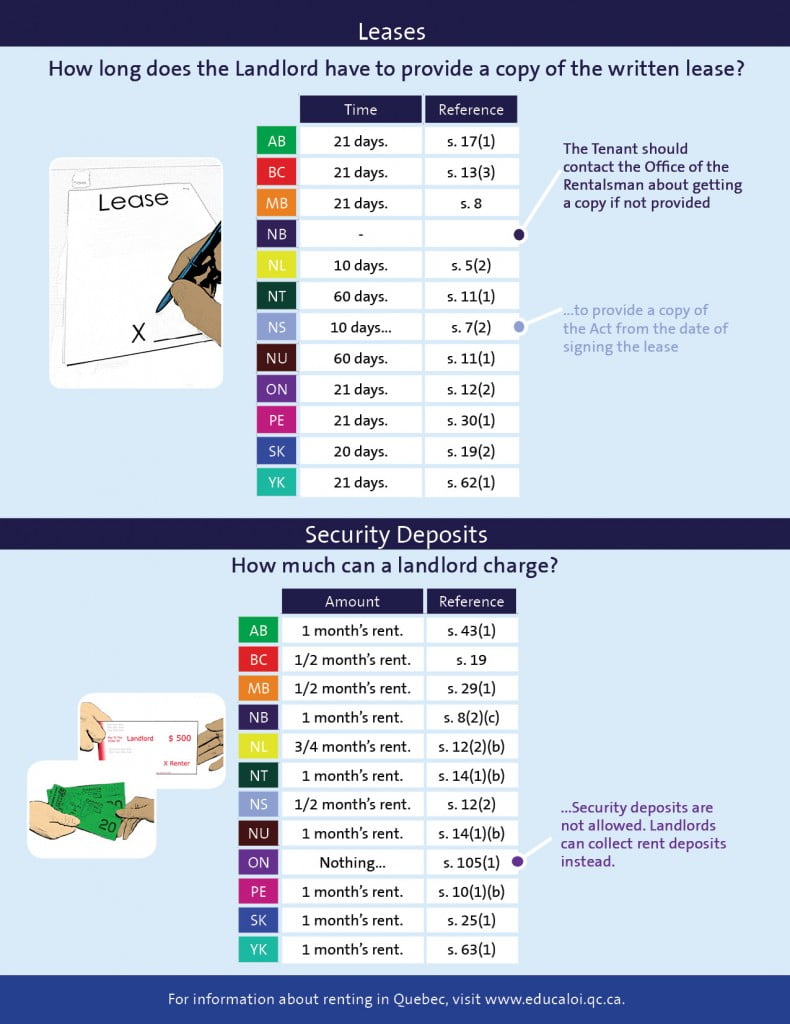
Essentially, a security deposit is money that the tenant pays to the landlord, on condition that it will be returned if certain things are done. When the landlord receives the money, they are usually required to protect this money somehow, usually by putting it in a trust account. In New Brunswick, the landlord pays the security deposit amount to the Office of the Rentalsman, who then holds the money until the tenant moves out. Regardless of where the money is held, when the tenancy is over, the landlord can use this money, or apply to use this money, to cover expenses that the landlord has incurred because of the actions of the tenant. Common reasons why a landlord would be allowed to keep the money are to cover damages beyond normal wear and tear to the property; last month’s rent (if last month rent has not been collected through a rent deposit); and any other fees that the tenant still owes.
With regard to the last month’s rent, in Ontario, the law allows the landlord to collect a rent deposit, but not a damage deposit. This means that the landlord can only use the deposit collected to cover unpaid rent of the tenant. If there are damages to the unit that the tenant is responsible for paying, then the landlord would have to make an application against the tenant to collect those funds.
When there are any fees or deposits, the landlord and the tenant should both know:
- the amount of the deposit or fee that is going to be charged;
- if it’s refundable or non-refundable;
- the reason the deposit is being collected; and
- what specifically the deposit can be used for.

Lease Agreement
There is not a lot of consistency across the country regarding requirements for written lease agreements. Some provinces have developed forms for their landlords and tenants to use, while other provinces have left it completely up to the landlord and the tenant as to what terms will be included in the lease. Most provinces do not require written leases, but all provinces share the requirement that if there is a written lease, then the landlord must provide a copy to the tenant within a specific amount of time.
Rent Increases
Rent increases are typically handled in one of two ways in Canada: either the amount of the increase is controlled by the government, or there is no limit on the amount that the rent can be increased. In provinces that have rent control laws, the rent can only be increased by a percentage amount that the provincial government sets. If landlords wish to raise the rent more than the percentage amount, they must receive permission to do so. In provinces where there are no rent controls, landlords can increase the rent by whatever amount the landlord determines is appropriate. Regardless of whether the rent is controlled or not, all provinces have notice requirements that must be followed by the landlord.
The notice requirements are provided so that the tenant has enough time to provide the landlord with notice to terminate the tenancy if the tenant cannot afford the increased amount of rent.
Fixed term tenancies are different. Some provinces allow rent increases during the fixed term if the rental agreement states the rent is going to be increased; some provinces do not allow the rent to be increased during the term of the tenancy at all; and some just require notice.
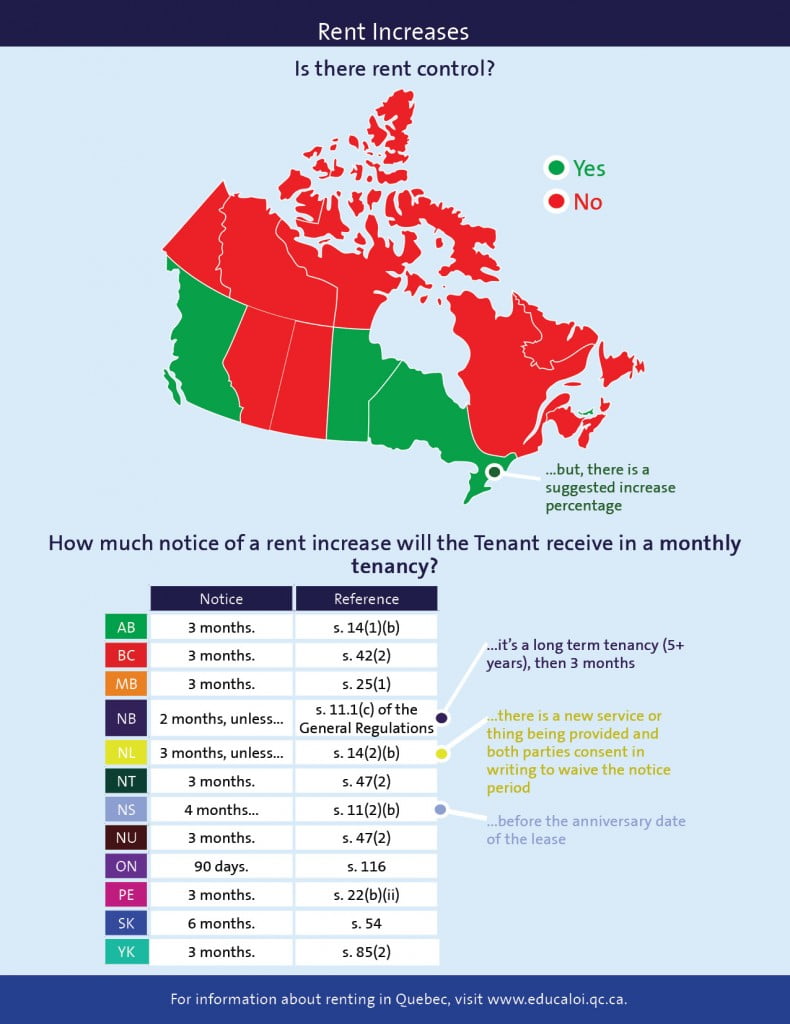
The notice requirements are provided so that the tenant has enough time to provide the landlord with notice to terminate the tenancy if the tenant cannot afford the increased amount of rent.
Fixed term tenancies are different. Some provinces allow rent increases during the fixed term if the rental agreement states the rent is going to be increased; some provinces do not allow the rent to be increased during the term of the tenancy at all; and some just require notice.

Ending a Tenancy
Periodic tenancies can be ended at any time by the tenant, so long as the tenant provides the landlord with the proper amount of notice. The landlord, on the other hand, cannot usually terminate periodic tenancies without having a specific reason that is allowed by the provincial legislation. If the landlord does fall into one of the reasons allowed by the law, then the landlord must also meet proper notice periods.
Fixed term tenancies are for a set period of time. Some provinces require that notice be given to end these tenancies, and some do not. Sometimes, a landlord may not be able to terminate the tenancy simply because the fixed term is over. In other words, the lease will automatically renew unless the landlord has another reason of why the tenancy must end.
Eviction procedures and timelines vary widely across the provinces as well. If a tenant is served with a notice, he or she should read the notice carefully to find out if there is a deadline. A tenant usually only has a limited amount of time to object or make an application against the landlord.
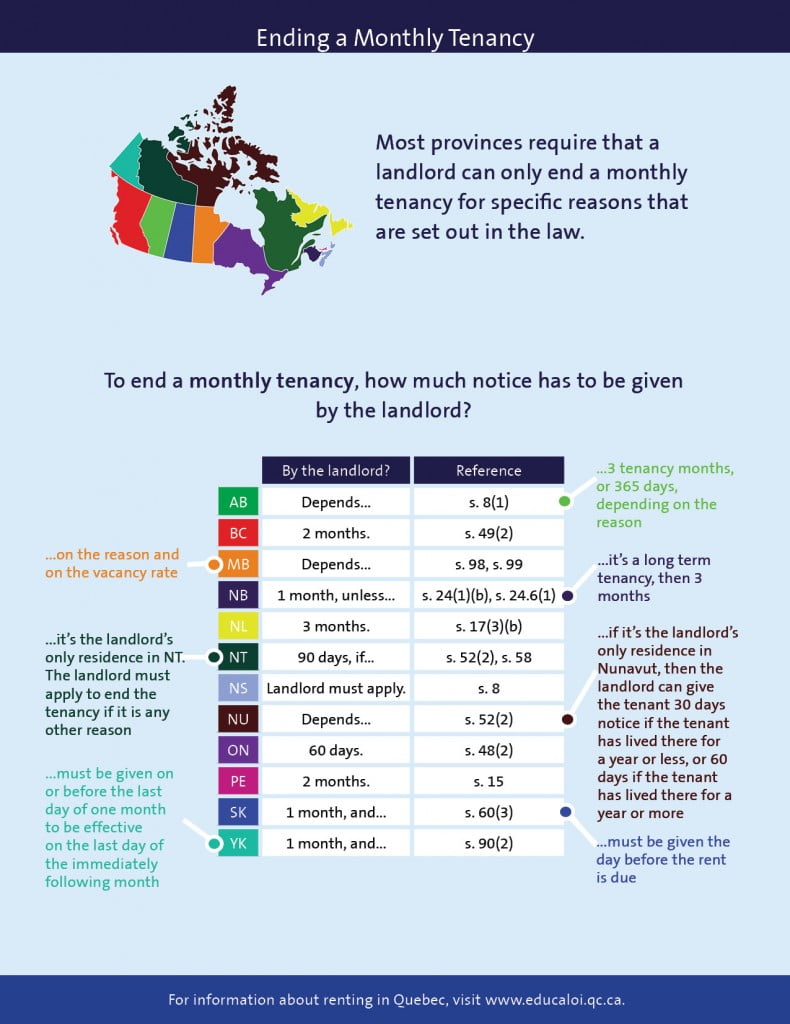
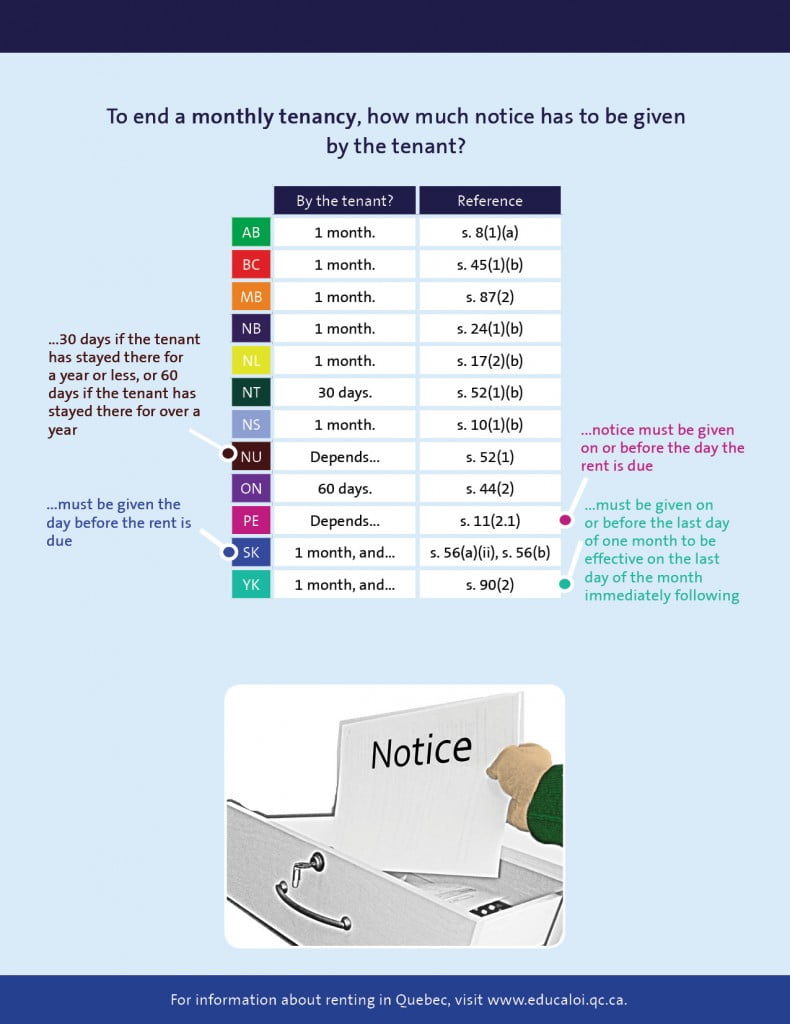
Fixed term tenancies are for a set period of time. Some provinces require that notice be given to end these tenancies, and some do not. Sometimes, a landlord may not be able to terminate the tenancy simply because the fixed term is over. In other words, the lease will automatically renew unless the landlord has another reason of why the tenancy must end.
Eviction procedures and timelines vary widely across the provinces as well. If a tenant is served with a notice, he or she should read the notice carefully to find out if there is a deadline. A tenant usually only has a limited amount of time to object or make an application against the landlord.


Provincial Quirks
There are some provinces that have some unique terms in their renting laws.
- Manitoba’s law contains an early termination section that allows a tenant to terminate a lease on one month’s notice if there is domestic violence or stalking.
- Nova Scotia allows the tenant to end the tenancy early for a variety of reasons, including health deterioration and lowered income.
- With regard to rent increases, some provinces provide that a rent increase runs with the property. This means that in Prince Edward Island, Nunavut and the Northwest Territories, if the landlord gives a rent increase notice, and the tenant moves out, then the landlord must charge new tenants the same amount as was stated in the notice. In other provinces that do not have rent control laws, landlords could increase the rent for current tenants, and if that tenant moves, then they could charge a different amount of rent to new tenants.
- The Northwest Territories also has very interesting laws regarding when a landlord could provide termination notices to tenants. There are special rules regarding landlord’s who rented out their only property in the NWT.
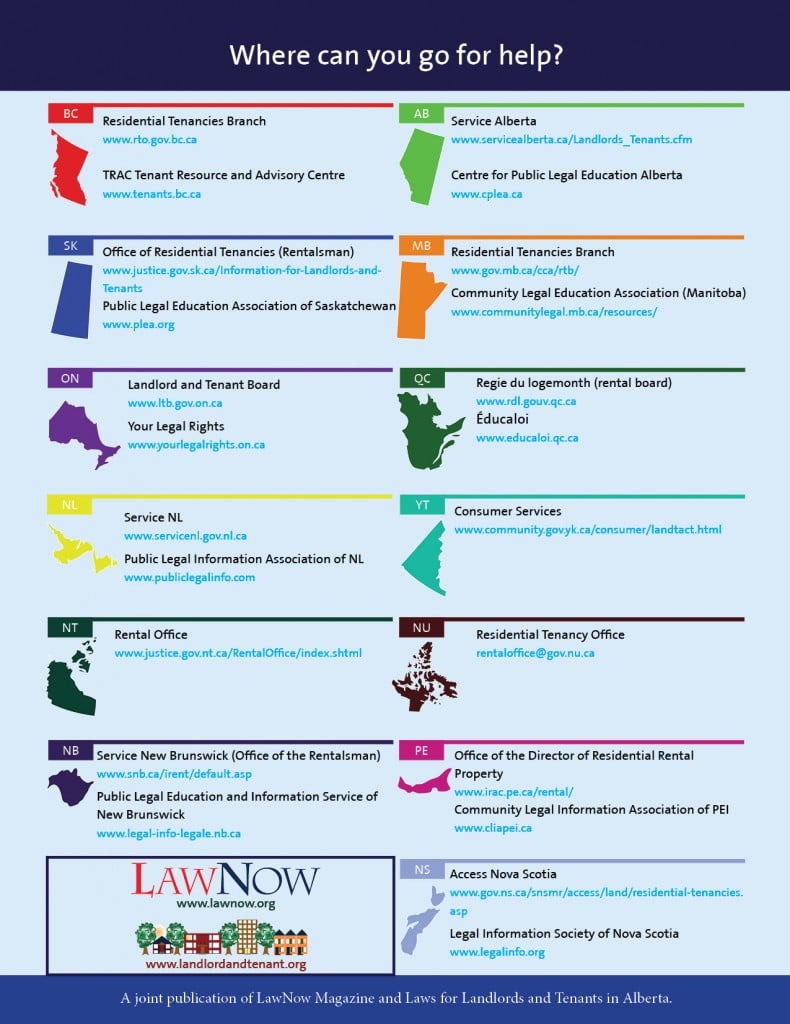
 This column was produced with the generous support of the Alberta Real Estate Foundation.
This column was produced with the generous support of the Alberta Real Estate Foundation.
- Manitoba’s law contains an early termination section that allows a tenant to terminate a lease on one month’s notice if there is domestic violence or stalking.
- Nova Scotia allows the tenant to end the tenancy early for a variety of reasons, including health deterioration and lowered income.
- With regard to rent increases, some provinces provide that a rent increase runs with the property. This means that in Prince Edward Island, Nunavut and the Northwest Territories, if the landlord gives a rent increase notice, and the tenant moves out, then the landlord must charge new tenants the same amount as was stated in the notice. In other provinces that do not have rent control laws, landlords could increase the rent for current tenants, and if that tenant moves, then they could charge a different amount of rent to new tenants.
- The Northwest Territories also has very interesting laws regarding when a landlord could provide termination notices to tenants. There are special rules regarding landlord’s who rented out their only property in the NWT.

Related posts:
Related Posts
--------------
IT'S ILLEGAL 2 CHARGE RENT OR SECURITY FOR PETS IN CANADA,....
Renters pay pet deposit, not pet rent
Pets may cost you a place to live or a deposit
by Romana King
Would
you be surprised if your landlord asked you for a pet security deposit? What if
your landlord asked you for pet rent? In the US, more and more landlords are
starting to tack on $10 to $50 per month in what is known as “pet rent.” You
can read the story on the Canadian Business site here.
Now,
if you’re a renter, don’t worry: Landlords in Canada cannot charge pet rent.
It’s totally and utterly illegal.
Landlords
can, however, charge pet security deposits at least in the vast majority of
provinces and territories (and the law is ambiguous in others).
But
why? Why would a landlord bother to ask for a sum of money just to cover
potential, future damage by Fido or Kitty? That’s how one landlord I knew
responded when asked, two years ago, if he would charge a pet deposit.
Then
came the professional tenants. Renters who know how to work the system and take
advantage of the law in order to live rent free, at least for a while.
After
almost eight months of Tenant Board hearings my friend, the landlord, was
eventually allowed to legally evict this family. It was only then he realized
the amount and extent of damage that was done to the unit—most of which was
done by a dog. The dog had defecated and urinated so frequently in the
marble-tiled vestibule that the tiles were now permanently stained yellow and
the house stunk of urine and feces. After an almost $10,000 clean-up
charge—that included having to jack-hammer out the soiled tiles—my friend
decided it was time to charge a “pet deposit.”
His
rationale was this: If a tenant wants to own a pet, then they’d have to fork
over some “insurance money for any anticipated costs spent on cleaning up after
their pet.”
It’s
sad, really, since the vast majority of renters are extremely respectful.
Still,
it’s good to know which legal leg you stand on, whether you’re a renter or a
landlord. That’s why I compiled a list of the pet deposit laws (and the renting
laws regarding pets) in each of Canada’s provinces and territories. The information
is gleaned from CMHC documents.
Alberta:
- No legal rules defining whether or not landlords can charge pet
security deposits.
- Landlords are allowed to refuse to rent to a tenant with pets but the
tenanacy agreement (ie: lease) must state this.
British
Columbia:
- Landlord’s can charge 1/2 a month’s rent for a pet damage deposit (and
this is in addition to any other deposit, such as a security deposit, or a
key deposit).
- A landlord can request a pet security deposit at any time during the
tenancy, once a pet is brought into the unit.
- A landlord may prohibit pets in a rental unit, but must include this
exclusion in the tenancy agreement (and it must begin when the tenancy
begins or the renter must voluntarily agree to an amendment during the
tenancy).
Manitoba:
- Landlord’s can charge 1/2 a month’s rent for a pet damage deposit.
- A landlord can refuse to rent to a tenant if they have a pet.
- If new management takes over a rental building and wants to impost a
no pets rule, then existing tenants with existing pets would be allowed to
keep these pets, but would not be allowed to replace them.
Newfoundland
& Labrador:
- There are no legal rules defining whether or not landlords can charge
pet security deposits.
- A landlord can refuse to rent to a tenant if they have a pet.
- If a lease states that pets are allowed, or the lease does not address
this issue, then pets are permitted in the rental unit.
New
Brunswick:
- There are no legal rules defining whether or not landlords can charge
pet security deposits.
- A landlord can refuse to rent to a tenant if they have a pet.
- Pet restrictions are strictly linked to a rental unit, not a person.
That means that a “no-pets” clause in a residential lease may prohibit a
renter from having a pet in the rental place, but doesn’t prevent the
renter from owning a pet.
- If a lease states that pets are allowed, or the lease does not address
this issue, then pets are permitted in the rental unit.
North
West Territories:
- An additional pet deposit of no more than 50% of one montht’s rent can
be charged by the landlord.
- Within 10 days of a renter lawfully vacating a rental unit, the
landlord must return the pet security deposit, with interest, and give the
tenant an itemized statement of account for any part of the security
deposit that is retained by landlord.
- A landlord can keep all or part of the security deposit for repairs of
damage caused by a tenant and their pet.
- A landlord can refuse to rent to tenants because of pets.
Nova
Scotia:
- There are no legal rules defining whether or not landlords can charge
pet security deposits.
- A landlord can restrict pets in rental unit(s) as long as:
- the rules apply to all rental units
- are at the start of tenancy or, if amended by the landlord, four
months notice is given before the anniversary of the date of the lease.
Nunavut:
- There are no legal rules defining whether or not landlords can charge
pet security deposits.
- A landlord may refuse to rent to a tenant who has pets, unless the
lease states that pets are allowed, or the lease doesn’t address this. If,
however, the landlord is renting out public housing units, they cannot
refuse to rent to a tenant with pets.
Ontario:
- Landlords can collect a pet rent deposit that equals up to one month’s
rent. However, this deposit cannot be a security deposit (as these are not
allowed in Ontario). That means the landlord cannot apply this deposit to
any damage caused by the pet and must return the deposit to the renter at
the end of the tenancy (with interest, as stipulated by the guidelines).
- The Residential Tenancies Act (RTA) doesn’t cover individuals before
they become tenants, so a landlord can refuse to rent to tenants with
pets.
Prince
Edward Island:
- There are no legal rules defining whether or not landlords can charge
pet security deposits.
- A landlord can refuse to rent to potential tenants based on a pet
exclusion.
Quebec:
- There are no legal rules defining whether or not landlords can charge
pet security deposits.
- A landlord can refuse to rent to potential tenants based on a pet
exclusion. However, a lease must address this issue. If it does not then
pets are allowed in the rental unit.
- Building by-laws can also prohibit pets, so renters should also review
a building’s bylaws before signing a lease.
Saskatchewan:
- There are no legal rules defining whether or not landlords can charge
pet security deposits.
- A landlord can refuse to rent to potential tenants based on a pet
exclusion. However, a lease must address this issue. If it does not then
pets are allowed in the rental unit.
Yukon:
- There are no legal rules defining whether or not landlords can charge
pet security deposits.
- This territory’s Landlord and Tenant Act doesn’t address the issue as
to whether or not landlords can refuse to rent because of pet exclusions.
As a
general rule of thumb, the lease has the final word on whether or not pets will
be allowed to live in a rental unit and whether or not a pet deposit will be
required. Sometimes landlords are open to pets, and a quick discussion could
find an amicable agreement to a renter’s desire to have a pet, and the
landlord’s desire to protect their investment. However, any agreement reached
verbally should be put in writing.
Also,
certain kinds of property will have additional restrictions and legal
obligations. For example, some condominium buildings won’t allow pets, even if
the provincial rules have no restrictions on pets in rental apartments. A
tenant must follow the rules of both the province and the condo, or they may
face lawful eviction.
For
more on rental laws in Canada, check out this great website.
RENTING IN CANADA....
-----------
3 Nov 2014 ... Would you be surprised if your landlord asked
you for a pet security ... be allowed to keep these pets, but would
not be allowed to replace them. ... Nova
Scotia: ... the rules apply to all rental units; are at the start of tenancy or, if ...
-------------
NOTE:
If a tenant
has lived in the premises for five or more years, they are considered to have
security of tenure and the landlord must apply to the Director for permission
to terminate the tenancy.
----
landlord
& tenant obligations
residential_tenancies_-_landlord__tenant_obligations.pdf
|
Landlord's
Obligations
|
RTA
section 9(1) statutory condition 1
The RTA contains Statutory Conditions to which both landlords and tenants must adhere. Some of the landlord’s Statutory Conditions that lead to landlord/tenant disputes are as follows: |
Condition
of Premises
|
A landlord has an obligation to keep residential
premises in a good state of repair and fit for habitation.
This condition means that a tenant can make an Application to the Director of Residential Tenancies (as will be discussed later) requiring their landlord to make repairs to their rental unit or render it fit for habitation (i.e. exterminate bedbugs or other pests, eliminate mould, obtain necessary occupancy permits, etc…). The RTA does not contain any provisions for forcing landlords to make repairs, or verifying that necessary repairs are carried out. This means that Residential Tenancy Officers are often reluctant to make orders requiring repairs. One option to compel landlords to make repairs is to request that rent be paid in trust to Residential Tenancies, and only be paid to the landlord once the repairs are completed – this is done via an order of the Director of Residential Tenancies (how to obtain an Order will be discussed later in the presentation). Another, often times, more effective method of forcing a landlord to make repairs is through Municipal or town By-laws. Some municipalities and towns have by-laws which set out minimum standards for residential occupancy. Should there be an applicable by-law a successful by-law complaint may result in a landlord being fined if they do not fix the problem that lead to the bylaw violation in a timely fashion. |
Entry
of Premises
|
A landlord may
only enter a tenant’s premises without consent if:
·
There is an emergency;
·
Notice of termination of lease has been
given and the unit is being shown to a prospective renter at a reasonable
hour; and
·
If written
notice is provided 24 hours in advance of the entry, and the entry is during
daylight hour
|
Entry
Doors
|
RTA section 9(1) statutory
condition 8
A landlord cannot unilaterally change the locks on the doors of a tenant’s unit, for any reason (i.e. due to late rent, if a landlord wants to evict a tenant, etc…) during the course of the tenancy. If a landlord changes the locks on a tenant’s unit the police should be contacted. If a landlord threatens to change the locks on a tenant’s unit a Residential Tenancy Officer should be notified so that they may contact the landlord, and advise them of their obligations pursuant to the RTA. |
Subletting
|
RTA section 9(1) statutory
conditions 5; RTA Regulation 2
A landlord cannot unreasonably or arbitrarily refuse a tenant’s request to sublet their rental unit (i.e. the landlord must have a legitimate reason to refuse a proposed subletter). A landlord may only charge a tenant for expenses actually incurred as a result of allowing the unit to be sublet. The current maximum fee for subletting that landlords can charge is $75.00. |
Abandonment
& Termination
|
RTA section 9(1) statutory
condition 6 & RTA section 6(3)
Prior to disposing of any property abandoned by a tenant a landlord must follow the procedure set out in the Regulations. Should a tenancy end without proper notice a landlord is also under an obligation to limit their financial damages as much as possible – i.e. by making an honest effort to re-rent the rental premises as quickly as possible. |
Good
Behavior
|
RTA section 9(1) statutory
condition 3 & RTA section 9(A)
A landlord must not act in a way that interferes with a tenant’s possession or occupancy of their rental premises. |
Landlord's
Rules
|
While not a
statutory condition, a landlord also has obligations with respect to making
rules for tenants.
A copy of rules must be provided to tenants prior to signing their lease, and 4 months notice is required to change or repeal a rule. Landlord’s rules must also be ‘reasonable’. In order to be considered reasonable a rule must meet the following criteria: It is intended to:
·
Promote a fair distribution of services
and facilities to all tenants;
·
Promote the safety, comfort or welfare
of tenants or people working in the building; or
·
Protect the landlord’s property.
It is reasonably related to the purpose for which it
was imposed;
It applies to all tenants fairly; and It is clearly enough written so that a tenant knows what they must do to comply with it. |
Tenant's
Obligations
|
The most
important tenant obligations relate to rent, good behavior, cleanliness and
insurance. They are discussed below.
|
Rent
|
A tenant’s most important obligation is to pay their
rent in full and on time.
It is impermissible to withhold rent under any circumstances, and rent should not be withheld as it exposes the tenant to the risk of eviction for non payment of rent. As will be explained later tenants can be compensated in the form of rent abatement should their landlord fail to meet their obligations pursuant to the RTA. |
Statutory
Conditions
|
RTA section 9(1) statutory
conditions 3 & 4
Like landlords tenants are also subject to some of the Statutory Conditions contained in the RTA: Good Behaviour Tenants must also be of good behaviour so as not to interfere with the landlord or other tenant’s possession or occupancy. Cleanliness & Damage Tenants are responsible for keeping their premises clean, and for any damage done by themselves or their guests. Tenants are not responsible for ordinary wear and tear of their rental unit. ‘Ordinary wear and tear’ means the usual degree of depreciation or deterioration caused by living in a residential premises relative to the length of the tenancy – faded paint, worn carpets in high traffic areas, etc… are examples of ‘ordinary wear and tear’. |
Tenant
Insurance
|
While not a statutory obligation many leases require
tenants to have tenant insurance. Provided
it meets the criteria for landlords’ rules this can be contained in a
lease. However if the lease says, for
example, ‘tenants are responsible for tenant insurance’ this doesn’t mean
they must have it, only that it is their
responsibility to pay for it and that a landlord’s insurance policy will not
apply to the tenant.
|
--------
---------------
1.
[PDF]
The Residential Tenancies Act (RTA) sets the rules for rent ... tenants.
The most recent change to the RTA took place in. November 2012. ... Tenancy Officer to make an order if your landlord is not following ... So, your starting
rent will be.
------------------
2.
[PDF]
To increase your rent,
your landlord must follow the rules of the ...
This article is about tenants' rights under the Residential. Tenancies Act (RTA). ... If your
housing is not covered by the
RTA, this information does not apply ... from the date your lease starts. This is ... Your landlord can make you pay
to replace your lost key or.
--------------------
NOVA SCOTIA –
LANDLORD & TENANT RULES CHANGE
Landlord & tenant rules change
Do you rent? Are you a landlord? If so, you need to
know that significant changes to Nova Scotia’s landlord and tenant rules took
effect on November 15, 2012. The changes are to the Residential Tenancies Act (‘RTA’), which is the law that sets out
the rights and responsibilities of landlords and tenants in Nova Scotia, and
provides a way to resolve disputes.
Some important ways in which the law has changed are:
Security of tenure means that a landlord cannot end a
tenant’s lease without a good reason.
Under the old rule tenants who lived in a place for
less than 5 years had no security of tenure, so the landlord could end the
lease without giving a reason, as long as they gave the tenant proper notice to
quit (‘notice’).
The new rule is that all tenants get security of
tenure right away. This means:
§
tenants
have the right to stay until they give the landlord proper notice that they are
moving out, except for a fixed-term lease, which ends on the date specified in
the lease; and
§
a
landlord can still give a tenant notice that they must move out, but must have
a valid reason for doing so.
Examples of reasons for a landlord to give notice
under the RTA are that the tenant:
§
is
at least 15 days behind on rent in a yearly, monthly or fixed-term lease (30
days behind for a land-lease community);
§
was
disruptive to other tenants, interfering with their ability to live in their
unit (‘bad behaviour’);
§
damaged
the premises;
§
sublet
or assigned the premises without the landlord’s consent;
§
broke
the lease terms or responsibilities under the RTA;
§
is
a safety risk to the landlord or other tenants.
The new rule allows a landlord to give a 15 day notice
to quit if the tenant is 15 days late in paying the rent. This
applies to a yearly, monthly, or fixed-term tenancy. The old rule was
that the tenant had to be at least 30 days behind in rent before the landlord
could give a 15-day notice to quit.
A tenant who gets a notice to quit for unpaid rent now
has 15 days to:
§
pay
the landlord all the rent that is past due. This will cancel the notice
to quit; or
§
apply
to the Director of Residential Tenancies (‘Residential Tenancies’) to dispute
the notice to quit; or
§
leave,
but unpaid rent will still be owed to the landlord.
If the tenant does nothing, and is still in the
property 15 days after getting the notice to quit, the landlord can apply to
Residential Tenancies for an order requiring the tenant to leave (‘order for
vacant possession’). If the landlord does this the new rules say
Residential Tenancies is not required to investigate, try to
mediate, or hold a hearing. Residential Tenancies can simply make the
order for vacant possession and mail it to the landlord and the tenant.
The tenant has 10 days from the date of the order to appeal to Small Claims
Court. If the tenant does not appeal then the Sheriff can evict the
tenant.
Before this change a landlord could not get a vacant
possession order without applying for a hearing at Residential Tenancies, and
the tenant had to get notice of the hearing. Now, no hearing is
required, so it is entirely up to the tenant to apply for a
hearing within the 15 days if they want to contest the notice and have their
say.
Tenants who want to
get out of their lease early for health reasons must now give notice to other
tenants, and the lease ends for all tenants
To end a yearly lease a tenant must normally give 3
months notice before the anniversary date.
However, a tenant in a yearly lease may give the
landlord just one month’s notice to quit if the tenant has:
§
lost
income because of deteriorating health;
§
cannot
continue the lease or access the premises because of deteriorating health; or
§
been
admitted to a nursing home or other special care facility.
The tenant must provide a doctor’s certificate, or
proof of acceptance into a nursing home.
The right to give short notice for health reasons or
admission to a home is not new.
What is new is that:
What is new is that:
§
the
short notice rules now also apply to tenants in a fixed-term lease;
§
the
tenant must give a copy of the notice to quit to any other tenants living with
them, at least 1 month before the tenancy ends;
§
the
tenancy end for all tenants, but the remaining tenants may negotiate a new
lease with the landlord. The landlord must agree to do this, unless there
is a good reason not to.
§
landlords
and tenants must use new Residential Tenancies forms, which are available
online at accessns.ca/residential-tenancies/forms;
§
the
terms mobile home, mobile home park and mobile home space have been replaced
with manufactured home, land-lease community and manufactured home space,
respectively;
§
tenants
in land-lease communities cannot have their rent increased by more than a
maximum annual amount (3% for 2013), calculated based on regulations under the
RTA. A landlord who wants to increase rent by more than the maximum
amount must apply to Residential Tenancies for permission;
§
Landlord
may charge up to a $75 fee for a sublet or assignment, but only for actual
costs incurred;
§
the
Residential Tenancies application fee and Small Claims Court appeal fee can be
awarded to the person who wins.
For more information about these and other changes to
the Residential Tenancies Act, or help with a landlord/tenant issue:
§
visit
Residential Tenancies online at accessns.ca/residential-tenancies;
§
call
Residential Tenancies at (902) 424-5200 or 1 800 670-4357;
§
visit
your nearest Residential Tenancies office (go to gov.ns.ca/snsmr/offices for locations).
The Residential Tenancies Act and regulations are available online: nslegislature.ca/legc/statutes/resident.htm and gov.ns.ca/just/regulations/regs/rtgenrl.htm
If you need more legal information or legal advice:
§
If
you are a tenant who has a low income Nova Scotia Legal Aid or
Dalhousie Legal Aid Service
may be able to help. Contact them for details.
--------------
Right to rent
As you pick up and pen and sign a lease, be
aware of your rights and limitations.
By Sarah Greene
"It's important for people to know what rights they don't
have," Cole Webber says to me on a hot afternoon on Gottingen. It might
sound like a strange perspective to have for the new coordinator of Dalhousie
Legal Aid's Tenants Rights Project, but Webber says we are badly in need of an
overhaul of our Residential Tenancies Act in Nova Scotia, because it tends to
protect the interests of landlords over tenants.
For students coming to Halifax from out-of-province, the act has a few
unpleasant surprises. First of all, Nova Scotia has no rent control. Unlike in
Ontario, where the maximum rent increase is the percentage change in the
Consumer Price Index plus three percent of the previous rent, and Montreal,
where maximum rent increases are calculated by the Rental Board, landlords in
Nova Scotia can increase the rent after 12 months by whatever amount they choose,
as long as they provide sufficient notice (four months before the end of the
term in an annual lease). Webber says market-dictated rent has contributed to
the fast rate of gentrification in neighbourhoods like the north end.
"Lots of students from low to moderate income backgrounds are suffering
from the lack of rent control," he says.
Speaking of money, another thing to watch out for is security deposits.
Legally, landlords are allowed to ask for a security deposit of up to half a
month's rent. Under the Residential Tenancies Act, the landlord is supposed to
return the security deposit---with interest---when the tenant moves out, unless
they are keeping all or part of the deposit to cover the cost of repairing
damages or unpaid rent. The problem is that some renters have trouble getting
their security deposits back. Webber says the onus is on the renter to apply to
Residential Tenancies Officers to get the deposit back from the landlord.
Dalhousie Legal Aid would like to change that by having third parties hold the
security deposit during a lease. As it stands, you can help protect yourself
from being unfairly charged for damages by doing a thorough inspection of the
apartment with your landlord at the beginning and the end of a lease.
Got a hole in your wall that isn't getting fixed? "Repairs are a big
issue for everybody," Webber says. As in the security deposit, the onus is
on the tenant to apply to Residential Tenancies to compel the landlord to get
the repair done.
One thing Webber says you can do is to put pressure on your landlord by
withholding rent. Under the tenancy act, tenants cannot be evicted until their
rent is 30 days late, leaving some wiggle room for late payment. But if being
30 days late on rent is a bargaining chip for a tenant, then landlords pushing
for postdated cheques takes that chip away (unless you cancel the cheque).
Webber describes a tenant-friendly approach to repairs in certain US
jurisdictions: "Tenancy acts empower tenants to pay for repairs that need
to be done and then just deduct that from the rent," he says, "and
then the onus goes to the landlord to go to Residential Tenancies to dispute
that."
A few notes on coming and going: Unless the tenant has security of tenure
(has rented for five years), landlords do not need a reason to not renew a
lease in Nova Scotia as long as they give proper notice (in a year-long lease,
three months before the end of term). If a tenant would like to end a year-long
lease, they also have to give three months notice. If you are moving out early,
your landlord must allow you to sublet your apartment or assign your lease to
someone else, though they also have the right to meet with the new person and
approve them. Webber cautions: "Landlords will sometimes try to gouge
people with unreasonable subletting fees. The maximum fee a landlord can charge
is $25."
Webber explains landlords tend to have more resources than tenants and are
more organized politically. If all this sounds a bit discouraging, he suggests
tenants in buildings and neighbourhoods should network with each other: "I
think people should take to heart what rights they are lacking and get
organized and active around expanding the rights that tenants have."
Dalhousie Legal Aid runs drop-in clinics for tenants, students and
non-students at the Halifax North Memorial Library (2285 Gottingen, 490-5723)
the first Tuesday of each month from 6-8pm. You can also pick up a Tenant
Rights Guide at Legal Aid's office (2209 Gottingen, 423-8105).
The Service Nova Scotia website (gov.ns.ca/snsmr/consumer/resten/)
has links to the Residential Tenancy Act and its regulations, forms including
the standard lease and information about applications to Residential Tenancies
Officers.
Lease laws
1. Landlords are lousy, money-grabbing scum. (No, not all of them. We kid, because we love. And we don’t want to be evicted.)
2. The rules for renting in Nova Scotia may not be what you’re used to where you come from, so check out your rights in every situation.
1. Landlords are lousy, money-grabbing scum. (No, not all of them. We kid, because we love. And we don’t want to be evicted.)
2. The rules for renting in Nova Scotia may not be what you’re used to where you come from, so check out your rights in every situation.
4 things to know if you're harassed by debt collectors
Know your rights to protect from
annoying collection agents, consumer advocate says
By Matt
Kwong, CBC
News
Bill collectors in Canada often use aggressive tactics to chase consumers, sometimes even managing to reel in payments when no credit was owed in the first place.
Some practices — such as daily phone calls, threatening language, accosting friends and relatives, or contacting debtors during late-night or early-morning hours — amount to illegal behaviour, depending on the province or territory.
"This woman had this debt collector banging with
his fists on the door, calling out details of the particular debt that she had,
and insisting that she pay it."—Bruce Cran, Consumers' Association of Canada
A CBC News investigation found
that employees at one
U.S.-based debt-collection firm operating in Ontario and Quebec knowingly
contacted non-debtors. The company was fined in two provinces for
violations and was the subject of hundreds of complaints over several years,
with one former worker saying that consumers have been pressured in the past to
make payments just to stop being badgered.But Bruce Cran, the B.C.-based president of the independent Consumers' Association of Canada, said it's not always best practice to hang up on credit agents or simply ignore them. One smart way for people to protect themselves against harassment is to know their rights.
"The time's come when people are looking for clarification because they're getting annoyed," he said. "Some of these debts we're talking about are so small, like $38 from eight years ago — it's ridiculous."
Here are a few questions you should know the answers to (the rules in Canada vary, so links to specific provincial laws are provided at the bottom of this story):
When
can credit agencies contact you?
Getting unexpected visits or
phone calls from a debt collector can be stressful enough. Many provinces try
to protect Canadians from being solicited at inconvenient times.
Collection
firm no-no's:
- Trying to collect a debt without
first notifying you in writing or making a reasonable attempt to do so.
- Recommending or starting legal or
court action to collect a debt without first notifying you.
- Communicating with you or your family
such that the communication amounts to harassment, or calling to collect a
debt at certain prohibited times (which vary from one province or
territory to another).
- Implying or giving false or misleading
information to anyone.
- Communicating or attempting to
communicate with you without identifying themselves, saying who is owed
the money and stating the amount owed.
- Continuing to demand payment from a
person who claims not to owe the money, unless the agency first takes all
reasonable steps to ensure that the person does, in fact, owe the money.
- Contacting your friends, employer,
relatives or neighbours for information, other than to get your telephone
number or address. An exception would be if any of these people have
guaranteed the debt or if you have asked the agency to contact them to
discuss the debt or, in the case of your employer, to confirm your
employment, your job title and your work address.
Cran said one person in London, Ont., complained to the Consumers' Association of Canada when she was jolted awake at 3 a.m. by knocking and shouting outside her home.
"This woman had this debt collector banging with his fists on the door, calling out details of the particular debt that she had, and insisting that she pay it," Cran said. "And when he left, there was a large piece of paper with the details of the debt tacked to her door."
The rules in most provinces state that credit agencies are prohibited from contacting consumers between the hours of 9 p.m. and 7 a.m. Those hours are a little more flexible in Alberta, which allow firms to contact people from 7 a.m. up until 10 p.m., as well as in Newfoundland and Labrador, which allows contact from 8 a.m. up until 10 p.m.
Saskatchewan, Nova Scotia and P.E.I. law won’t allow collection agents to call a suspected debtor before 8 a.m., and Manitoba restricts calls or visits before 7 a.m.
Sundays are also partially prohibited days in most provinces, as are statutory holidays.
How
often can collection firms contact you?
Cran said it's not uncommon for
some Canadian collection firms to get their agents to phone or visit debtors
daily, including on Sundays.Yukon Territory legislation mentions that agents must not make calls with such frequency that it could be considered harassment.
But in Ontario, debt collectors can't email, leave voice mail or speak in person with the consumer more than three times in one week after the first conversation with you. The only permissible means of communicating is by regular mail. Alberta and Nova Scotia have a similar "three strikes" rule limiting the amount of contact from collectors within a seven-day consecutive period.
"One of the things you can do in B.C. and most other provinces is inform these people that they're not to contact you, but they can only contact you by mail," Cran said. "After you've done that, they're not allowed to phone you."
Some provinces — such as Ontario, B.C., Quebec, Alberta, P.E.I. and Nova Scotia — have laws stating that contact must cease if the consumer has "properly disputed" the debt owed. A person can contest the debt in writing and send a registered letter to the agency informing the firm that the case can be taken up in court.
Can
the debt collector lie or threaten legal action?
Consumers'
Association of Canada president Bruce Cran says heavier fines could help act as
a deterrent. (CBC)
Deception could be part of an
unscrupulous collection business's arsenal of dirty tricks.Nearly every province or territory has a consumer protection law specifically addressing the use of bogus legal documents or false information to mislead the debtor.
Misinformation can run the gamut from lying about the amount of debt owed to pretending to be someone different (for example, posing as a lawyer) to threatening to sue when the collection firm has no intention or authority to do so.
As far as verbal abuse goes, Ontario, Alberta, New Brunswick and Nova Scotia are among the provinces that state that collection agents cannot use profane, intimidating, or "coercive" language when dealing with debtors. Alberta and Northwest Territories also mention that collection agents may not threaten physical harm.
Can
they ask other people about you?
In general in Canada, collectors
can’t approach a debtor's family, friends or employer, though Cran said he's
heard of agents showing up in public venues to accost a debtor about
outstanding bills."They'll find out where you congregate, maybe after lunch or after work where you’ve gone to have a beer, and they’ll approach you in front of friends — anything to embarrass you," Cran said.
New Brunswick's regulations state that a collector can’t threaten to embarrass a debtor with information about credit woes.
There are a couple exceptions to rules prohibiting communication with friends, family and co-workers.
For example, the agent may, in some cases, contact a target debtor’s acquaintances in order to track down a mailing address. There might also be exceptions for speaking with a neighbour or family member who has agreed to act as a guarantor for the repayment of the debt.
- Ontario: Ontario
Ministry of Consumer Services
- British Columbia: Consumer Protection BC and Business
Practices and Consumer Protection Act
- Alberta: Service
Alberta: Bill Collection and Debt
- Yukon Territory: Yukon
Community Services - Tips - Collection Agencies
- Northwest Territories: NWT
Consumer Protection Act and Consumer
Affairs Tips - Collection Agencies
- Saskatchewan: The Collection
Agents Act
- Manitoba: Government
of Manitoba - Collection Practices
- Nova Scotia: Access
Nova Scotia - Collectors and Collection
Agencies Act
- Quebec: An
act respecting the collection of certain debts and Les
comptes en souffrance
- New Brunswick: Public
Legal Education and Information Service
- Prince Edward Island: Collections
Agencies Act and Department
of Environment, Labour and Justice
- Newfoundland and Labrador: Service
NL - Collection Agencies
- Nunavut: Nunavut
Department of Justice and Current
Consulidated Statutes and Regulations
http://www.cbc.ca/news/canada/4-things-to-know-if-you-re-harassed-by-debt-collectors-1.1153120
----
What Renters and Landlords Need to Know!
In January, 2007, the Residential
Tenancies Act (RTA) replaced the Tenant Protection Act (TPA). Also, on
this date, the Ontario Rental Housing Tribunal became the Landlord and Tenant
Board.
Two years have passed, yet, many tenants
and landlords are still unfamiliar with the changes that this legislation
generated.
One of the key changes that affects all
applications is the provision that there are no longer default orders.
What this means is that if an application is filed, a hearing must be held
FIRST – before any order is issued. This hearing will review all the
relevant circumstances surrounding the application and will consider granting,
delaying or refusing a tenant’s eviction if circumstances warrant.
Tenants who are being evicted for rent
arrears can now raise other issues at a hearing. As long as the issues
raised could be dealt with on another Landlord and Tenant Board application, a
tenant can now raise these issues in defence of their rent arrears. For
example: “ I didn’t pay my rent because my toilet is broken and my landlord
refuses to fix it.”
There are many other changes affecting
tenants under the Residential Tenancies Act legislation.
For more information or assistance —
tenants can call 461-3935 or attend the
Elliot Lake and North Shore Community Legal Clinic at 31 Nova Scotia Walk (Elnos Building) Suite 300.
Elliot Lake and North Shore Community Legal Clinic at 31 Nova Scotia Walk (Elnos Building) Suite 300.
· TOP 10 THINGS EVERY TENANT AND LANDLORD SHOULD
KNOW….
1. You CANNOT be evicted for filing
a Residential Tenancies Act application against your landlord. The
Tribunal was set up to give Landlords and Tenants a venue to solve their
disputes.
2. Your landlord is legally
obligated to provide you with rent receipts if you ask for them. If your
landlord refuses to do so, you can call the Investigations Unit at
1-888-772-9277.
3. You CAN be evicted during the
winter months. However, no matter what time of year it is, you Landlord
must obtain an order from the Landlord and Tenant Board before he or she can
evict you.
4. Your landlord cannot evict you
for having a pet unless your pet is damaging the unit or common areas, or
interfering with the reasonable enjoyment of other tenants.
5. Your landlord must pay you
interest on your last month’s rent deposit once per year.
6. Your landlord can only raise
your rent once per year after giving you 90 days notice and it can only be
raised in accordance with the rent increase guideline set by the Ministry of
Municipal Affairs and Housing. The guideline for 2008 was 1.4%. The
guideline for 2009 is 1.8%. If your landlord wishes to raise your rent
above the guideline then he or she must file an application with the Landlord
and Tenant Board and get a legally binding order permitting him or her to do
so.
7. Your landlord cannot charge you
for any deposit that is not meant to be used as a first or last month’s rent
deposit. He or she can ask you to pay a deposit for keys or an access
card but the amount cannot be more than it would cost to replace these
items.
8. You are required to give a 60
notice in writing to your landlord prior to moving out, if you are on a “month
to month” lease agreement. If you move out without providing 60 day
written notice – you may be breaking your lease, and your landlord can hold you
financially responsible for the rent until the end of your lease agreement
unless the landlord is able to rent the unit before the lease is up.
9. Your landlord can enter your
unit without notice only when there is an emergency or your tenancy agreement
says that your landlord is to provide you with cleaning services.
Otherwise, your landlord must give you written
notice 24 hours in advance and can only enter between the hours of 8:00 a.m. and 8:00 p.m. with your permission.
notice 24 hours in advance and can only enter between the hours of 8:00 a.m. and 8:00 p.m. with your permission.
10. You cannot hold back your
rent. You must pay your rent even if there are maintenance issues that
your landlord is not taking care of. There are applications you can file
in order to ask for a rent abatement (adjustment), but you must continue to pay
your rent otherwise your landlord can take you to the Landlord and Tenant Board
for arrears of rent and possibly have you evicted.
For information or assistance contact
the Elliot Lake and North Shore Community Legal Clinic at 461-3935 or the
Landlord and Tenant Board office in Sudbury at 1-866-410-1399.
---------
Tenants’ Rights
The information in this section is based on Nova Scotia’s Residential
Tenancies Act and its associated regulations. If you have further questions or
would like clarification on any of the information in this section, Service
Nova Scotia maintains its own tenancy-related frequently asked questions
section at http://www.gov.ns.ca/snsmr/consumer/resten/faq/.
You can also call 1-800-670-4357 for general enquiries.
Dalhousie Legal Aid Service (DLAS) also runs a Tenant Information Phone
Line, which can be reached at 423-8105. DLAS has also prepared a
comprehensive Tenant’s Rights Guide. For a copy visit http://tenantrights.legalaid.dal.ca.
The Source of Your Rights as a Tenant
In Nova Scotia, the Residential Tenancies Act establishes the standard
rights and responsibilities of both tenants and landlords. Landlords are
required to provide tenants with a copy of the Act after they have signed a
rental agreement. If you have misplaced your copy of you simply want to see
what is included in the Act, the full legislation can be found on the web at
http://www.gov.ns.ca/legislature/legc/statutes/resident.htm.
In Nova Scotia, the Residential Tenancies Act (RTA) favours the
interests of landlords who own and profit from rental housing, not the tenants
that actually live there. A lack of protection for tenant’s under the RTA makes
it difficult for tenants to recover their damage deposits, to avoid evictions,
and to even fight for basic repairs. In this context, it is especially
important that if you are renting a house or apartment, you know your rights.
By knowing what you are entitled to under the law, you help protect yourself
against being treated unfairly.
Are you protected by the act?
The Residential Tenancies Act applies to people renting apartments,
houses, flats, and mobile homes, as well as individuals living in rooming
houses. People that live in student residences, shelters, or hotels are not
protected by the Act.
The Federation has consistently lobbied to extend tenancy protection
for students living in residence. If you are interested in finding out how to
push for tenant’s rights for students living on and off campus visit your
students’ union office.
Can You Be Refused Rental Housing?
In Nova Scotia, a potential tenant cannot be denied rental housing on
the basis of any of the characteristics listed in the Nova Scotia Human Rights
Act. The only exception to this protection occurs when a landlord is renting out
a single room in an occupied dwelling and has not advertised the vacancy.
Although a landlord cannot discriminate against someone due to his or
her source of income, the landlord can choose to not rent to someone if the
landlord feels that he or she will not be able to afford the rental fees.
Landlords will usually run credit checks in order to determine a potential
tenant’s financial state.
Agreements
When you sign a lease, you enter a binding legal contract. In Nova
Scotia, if a tenant makes a verbal agreement to rent from his or her landlord,
there is deemed to be a landlord/tenant relationship governed by the Act. The
term is considered month-to-month where there is no written lease. It is
preferable to have all commitments from your landlord in writing.
A tenant cannot be made to agree to anything that is illegal or
contradicts the standard form of lease.
Landlord’s Rules
While a landlord cannot bind you to any contractual terms that are
contrary to the Act or illegal, he or she is free to insert rules into your
lease as long as the terms are not illegal and can be considered “reasonable.”
For instance, a landlord could insist upon a no-smoking rule or choose to
disallow pets. You may be subjected to other obligations as well, such as
agreeing to steam clean your carpets upon moving out of the dwelling.
What is a Co-Signer?
A co-signer is someone who enters into a rental agreement along with
you. In a practical sense, this means that they are willing to assume your
debts if you fail to pay them. Many landlords will require a co-signer when
they rent apartments to students.
Security (or Damage) Deposits
The Residential Tenancies Act allows a landlord to require a security
deposit from new tenants, but it sets out several rules governing the process.
This security deposit is intended to help cover the cost of damage to the unit
or unpaid rent.
You do not have to pay any extra deposits above this amount (such as a
“key deposit”) and a landlord cannot charge potential tenants an application
fee.
Regular wear and tear does not count as damage.
Upon moving out, tenants should verify the address where the security
deposit is to be sent.
If, after the time period specified under the Act, you have not
received your deposit or notice of an arbitration hearing, you can make a claim
at Service Nova Scotia.
If you leave your rental unit before the end of your lease, your
landlord may be able to keep some or all of your deposit in order to make up
for lost rent.
Before You Sign
Most landlords will be friendly before you sign your lease, but there
is no guarantee that relations will remain pleasant for the duration of your
rental period. Here are a couple of things that you can do in order to help
protect yourself:
Take a look through the unit and note everything that is damaged. It is
a good idea to take pictures.
If the landlord tells you that he or she is going to make improvements
to the apartment or makes any other promises, insist that these promises are
put into writing.
Remember that you will be bound by all the terms of your lease, so read
it carefully before signing it.
Rent
During a lease, your rent will be due on the date set by your
landlord-normally the first day of each month. It is your responsibility to pay
your rent on time; otherwise, the landlord may be able to begin the eviction
process if enough time has lapsed. Landlords can charge a late payment fee of
one percent per month of the monthly rent. If you have to pay your rent in
cash, make sure that you get a receipt. Landlords can require you to provide post-dated
cheques.
The Residential Tenancies Act outlines when a landlord can increase
your rent. If your rent increases, consult the Act to determine if the increase
is within the regulations.
If any service you are paying for is removed (such as laundry or
cable), you can demand it be returned, or ask for a lower rent payment. The
withdrawal of a service is considered a rent increase; therefore, a landlord is
required to inform you of the removal under the same regulations as they would
a rental increase.
If you are presented with an illegal rent increase, you should write
your landlord a letter telling him or her why the increase is illegal and make
a copy for yourself. If you have any disputes with your landlord over rent, do
not withhold your rent payments without an order from an arbitrator.
Eviction
A landlord must give you proper notice before attempting to evict you.
The amount of notice you are entitled to receive depends on why you are being
evicted.
Landlords cannot legally evict tenants (physically remove the tenants
and their belongings) until they have an Order of Vacant Possession from
Residential Tenancies.
Contact Service Nova Scotia and Municipal Relations toll free within
Nova Scotia 1-800-670-4357, in Halifax 424-5200 to find out the
amount of time you have to file your complaint.
Repairs
Your landlord is responsible for maintaining the building that you live
in and making any repairs required in order to keep your rental unit healthy,
safe, and “suitable for occupation.” This includes plumbing, heating, and
electrical repairs as well as maintaining appliances, storage areas, and any
other amenities that are included in the rent. The landlord must also make sure
that you have access to your unit.
As a tenant, you are expected to keep your home clean and to repair any
damage that you or your guests may have caused. You cannot, however, be charged
for regular wear and tear on your apartment.
You should report any needed repairs to your landlord as soon as
possible. If you cannot contact your landlord, the need for emergency repairs
should be reported to the emergency contact that he or she has provided. If you
are still unable to contact anyone, you can make an Application to Director
seeking repairs. Forms for this application can be found at any Access Nova
Scotia office or online at
http://www.gov.ns.ca/snsmr/access/land/residential-tenancies/downloadable-forms.asp.
If you live in the Halifax Regional Municipality, your landlord may
also be obligated to conform to municipal by-laws. The city has adopted a range
of requirements for occupational residences, setting standards for things like
windows, stairs, balconies, bathrooms, and kitchens. More information can be
found at: http://www.halifax.ca/legislation/bylaws/hrm/index.html. If
you have any questions about these by-laws, you can call the Halifax General
Information Line at 490-4000.
Landlord Access
Your landlord has the right to enter your rental unit during
“reasonable hours” (usually considered to be 9am to 9pm) for the purpose of
showing, inspecting, or working on the property. The landlord is required to
give you 24 hours’ written notice of his or her intention to enter the
premises. If either you or your landlord has given notice to end the tenancy,
the landlord does not have to provide you with any notice.
Subletting/Assigning
If you wish to move out before your lease is up, your landlord may be
willing to cancel your lease but he or she is under no obligation to do so. As
an alternative, you may be able to find someone else to take over your lease.
When you assign a lease, you transfer your rights and obligations to another
person. In such a case, you are leaving the property and have no intention to
return.
When you sublet, you are yourself renting out the unit for a fixed
portion of the lease’s duration. Many students sublet their apartments for the
summer and then return to them in the fall.
Giving Notice and Moving Out
If you are not interested in renewing your lease for your apartment,
you must give proper notice to your landlord indicating your intention to move
out at the end of your lease. The notice required will depend on the length of
your lease. Ensure that you are familiar with notice requirements when signing
your lease.
Your notice to end the tenancy must be in writing and needs to include
your name and address, the date you plan to move, and your signature. You have
until midnight on the last day of the month to move out unless you agree to
some other time. If you do not give proper notice and the landlord cannot find
another tenant, you may lose your security deposit and may have to pay the rent
for the following month(s).
If you have signed a “fixed-term lease” or a lease with a “move-out”
clause (which says you have to move out when the term of the lease ends), you
have to move out when it says you do and neither you nor the landlord has to
provide notice.
Arbitration
If, during your tenancy, you have a dispute with your landlord that
cannot be resolved, you may apply to have it resolved through arbitration. This
is done by filing an Application to the Director. The necessary forms are
available online or at any Access Nova Scotia office and there is a $25.00
filing fee. See the website for more information: http://www.gov.ns.ca/snsmr/consumer/resten/
If either the tenant or the landlord is not willing to accept the
recommendations of the Director’s Report, the issue may proceed to Small Claims
Court. It costs $80.00 to file a claim at this level. There is a fee waiver
available for low-income individuals. To be eligible, applicants must provide
proof of income along with their application.
-----
4.
Moving
in
Looking for a place to live is
serious business. Be sure to do your research. Some good first steps:
·
Everyone on a lease is equally
responsible for the rental space. If you are living with others, find roommates
you trust, and involve them in all of your renting decisions.
·
Make sure everyone who will be on
the lease agrees about locations, the number of bedrooms and bathrooms, and the
appliances and amenities you want to be included.
·
Decide how much you are willing to
pay each month. Make sure to account for rent, utilities, and other living
expenses (electricity, cable, phone, parking, heat, etc.)
·
Visit premises (apartments,
houses, manufactured home spaces, etc.) that meet your needs. Make sure you
choose one that fits your budget.
·
If you and the landlord have
agreed that repairs or renovations will be done before you move in, you should
put this agreement in writing and include a completion date. If you have agreed
to make the repairs yourself, make sure that any financial compensation is
included in the agreement. The landlord and tenant should both keep a copy.
A landlord cannot charge an
application fee for residential premises. The landlord may ask you to complete
an application form, and will probably ask you to provide your Social Insurance
Number, employment information and some references.
Letting your landlord know that
you are aware of your rights may help you address this issue. Any money taken
by a landlord before the lease has been signed or before rent is due is
considered a security deposit.
When you sign the lease, the
landlord may ask for a security deposit. The deposit can be up to one-half of
one month's rent. The landlord may be able to use your security deposit when
you leave the apartment to cover any rent you have not paid, or for any repairs
or maintenance that must be done in the unit because you caused damage or
didn't report things in need of repair. A certain amount of wear and tear on a
unit is considered normal, and the deposit cannot be used to pay for repairing
this.
The landlord must let you know
that he/she intends to keep your security deposit, and may not do so unless you
agree in writing. If there is disagreement, your landlord may apply to the
Residential Tenancies program to keep the deposit.
The landlord must place the
security deposit in a trust account. The deposit will earn interest at rates
set by the regulations to the RTA. The account remains with the property and
not with the landlord, so if there is a change of landlord, the deposit becomes
the responsibility of the new landlord.
A landlord can ask you to provide
post-dated cheques for your rent, but a landlord cannot ask you to pay more
than one month (or week) of rent at a time.
You should inspect the premises
when you move in. The inspection can be done with or without the landlord,
though it is better if you do it together.
Make a written record of the
inspection.
Sign and date the inspection. It
is a good idea to get the landlord to sign it as well. If the landlord can't or
won't sign, send signed copy to the landlord. Keep a copy.
It is a good idea to take pictures
of any damage you find when you move in. Use the date stamp on your camera.
Standard Form
The Residential Tenancies
Regulations contain a Standard Form of Lease.
A landlord does not have to use
this lease, but the lease the landlord uses cannot remove any rights the tenant
is given in the standard form. A written lease is always recommended, but if
there is no written lease, the standard form applies.
On the lease, the landlord must
give you his or her name, address, and telephone number or the name, address,
and telephone number of a person responsible for the premises. You must give
the landlord the names of anyone who will live on the premises.
Types of Leases
There are two kinds of leases:
·
A periodic lease is one where the
lease is signed for a year, a month, or a week. The tenancy can continue
year-to-year, month-to-month, or week-to-week until the tenant gives notice
they no longer wish to renew it. (See "At the End
of a Tenancy.")
·
A fixed-term lease has a specific
start and end date. The lease does not renew after that date.
A tenant and landlord may agree to
additional fixed lease terms. If a tenant does not leave, or is not asked to
leave, after the end date in the original lease, a month-to-month lease begins.
Cosigners
Based on your finances, a landlord
may require you to have a co-signer. The person who signs as a co-signer may be
held responsible for the payment of the rent and/or damages. Make sure your
co-signer understands his or her responsibilities.
Documents
When there is a written lease, it
must be signed by both the landlord and the tenant. The landlord must give a
signed copy of the lease to at least one tenant named on it. The landlord must
also give at least one tenant from any group of tenants on a lease a copy of
the Residential Tenancies Act.
The landlord must give both the
lease and the RTA within ten calendar days of whichever of these things happens
first:
·
you sign the lease
·
you receive keys
·
you move in.
If the landlord does not provide
you with a copy of the lease you have signed, you may give a written notice to
the landlord to end the tenancy, and leave. You must leave within three months
of giving this notice.
Related Links
Quick Links
- Changes to RTA - for Tenants
- Changes to RTA - for Landlords
- Canada Mortgage and Housing Authority
- Canadian Federation of Co-op Housing
- Nova Scotia Small Claims Court
- Nova Scotia Housing Authorities
- Manufactured-Home Advisory Committee
- Residential Tenancies
- Tenant's Guide
- Landlord's Guide
- Program Policies
- Residential Tenancies Guides
- Annual Allowable Rent Increase Amount
- Tenancies Glossary
- Example Orders of the Director
- Downloadable Forms
- Security Deposit Interest Calculator
- Contact
- First-Time Home Buyers Rebate
- Personal Property Registry
---------------
During
a Tenancy
1.
Paying
Rent
Pay your rent on time, every time.
It is your responsibility to make sure rent is paid - a landlord does not
need to collect it from you. A landlord can charge one percent of the monthly
rent, per month, for any late rent.
You may not withhold rent payments
to encourage the landlord to make repairs or to take other action. (See "If There are Problems.")
If you are having trouble making
your rent, talk to your landlord as soon as you know there's a problem. Your
landlord may be willing to work with you to make an arrangement to make sure you
do not go into arrears.
Once your rent is 15 days late,
your landlord may give you a 15 day Notice to Quit. This notice means that if
you don't pay your rent within those 15 days, you will have to leave on the
date shown on the notice.
If you pay your rent before the 15
days are over, the Notice to Quit will be set aside and your lease will
continue as it did before. You may wish to talk with your landlord to reassure
them that you will continue to pay your rent.
If your landlord gives you a
Notice to Quit and you believe you have paid the rent, you may dispute the
notice. (See "If There are Problems.")
Rent can only be increased once in
a 12-month period, on the anniversary date of the tenancy.
Notice of a rent increase must be
given in writing and must state the amount of the increase and the date the
rent will go up.
Landlords must give you:
·
four months notice if you're in a
year-to-year lease
·
four months notice if you're in a
month-to-month lease
·
eight weeks notice if you're in a
week-to-week lease
For fixed-term leases, the amounts
and dates of all increases must be included in the lease when it is signed.
The rent can be increased by any
amount. If you do not agree with a rent increase, you may give three months'
Notice to Quit to your landlord before the anniversary date, and leave.
If your landlord plans to
discontinue a service or privilege, it is considered to be a rent increase and
the landlord is required to give the proper notice, as shown above. There are
different rules for Manufactured Homes and Land Lease Communities, (see "Manufactured Homes and
Land-lease Communities") and for Public Housing.
In public housing, if rent is
geared to income, an increase in the percentage of income charged as rent is
considered a rent increase and the landlord must give proper notice of four
months prior to the anniversary date. The total amount paid in rent may
increase or decrease with the tenant's income – this is not a rent increase.
When you are living in your
residential unit, you may choose to change a year-to-year lease to a
month-to-month one. To do this:
·
give your landlord written Notice
to Quit three months prior to your anniversary date. Attach a written request
to begin a month-to-month lease when the year-to-year lease has ended.
·
the landlord has 30 days to
respond to your request. If the landlord does not answer within the 30 days,
the lease will automatically go month-to-month.
If you have a fixed-term lease,
you can only change the terms if you and your landlord agree to do so. It is a
good idea to get this agreement in writing.
There are two ways to have someone
else move into your unit while you are still under a lease:
·
If you plan to leave for a period
and then return, you may wish to use a sublet. A landlord must have a good
reason to refuse to allow you to sublet. The landlord may charge $75 to assess
a sub-tenant.
·
If you do not wish to continue
with your lease, you may ask to assign any months remaining on your lease to a
new person. The new person then becomes responsible for following the lease and
paying rent until it has ended.
A landlord must have a good reason
to refuse to allow you to assign your lease. The landlord may charge $75 to
evaluate a person you wish to assign your lease to.
Rules
A landlord can make rules for a
rental property. Rules cannot remove obligations of either the landlord or
tenant under the RTA or Standard Form of Lease. Rules must be reasonable, and
apply equally to all tenants.
The landlord should give you a
copy of the rules before you sign the lease. If you are not given a copy, you
should ask if there are any additional rules before you sign. If you wish to
have a pet, you should check the rules for the premises to make sure that pets
are allowed. If your landlord allows pets, it is a good idea to get it in
writing. A landlord may not charge an additional deposit for you to have a pet.
All security deposits, including a pet deposit, must be no more than one-half
of one month's rent.
Maintenance
You must keep the rental unit and
all the appliances clean. You are responsible for any repairs that must be made
due to neglect or damage done by any guests you allow into the premises. You
must not interfere with the landlord's or the other tenants' ability to safely
occupy the premises.
Heat and Utilities
A landlord is not permitted to
turn off the heat to a unit, even if there is rent owing or another dispute. If
you are responsible for heating your unit, you must be sure to keep it warm
enough to prevent damage. The temperature on the premises should be 70F° to
72F° / 20C° to 22C°. The landlord is not permitted to disconnect other
utilities (electricity, water, cable for example) included in the lease.
Locks
Locks can only be changed if both
you and your landlord agree. Your landlord is entitled to a key to your unit.
Insurance
You are responsible for insuring
your personal belongings. Your landlord may request a copy of the policy as a
condition of your lease.
Landlord Access
A landlord may only enter the
rented premises if:
·
There is an emergency.
·
The landlord has given written
notice that he or she will be entering the premises and the entry is during
daylight hours.
·
A Notice to Quit has been given by
the landlord or the tenant and entry is made during daylight hours to show the
premises to prospective tenants or purchasers.
A notice to enter should state the
time and date the landlord plans to enter the unit and be signed by the
landlord or representative.
If a landlord is trying to sell or
rent the premises, a real estate agent must be allowed to enter. The agent may
be required to provide proof of authorization from the owner. The agent is to
enter only during daylight hours and if no Notice to Quit has been given,
24-hours notice must be given to the tenant. An "Open House" can only
be held with the consent of the tenant.
Related Links
IF U HAVE A DISAGREEMENT
WITH YOUR LANDLORD- LEGAL RECOURSE
1.
[PDF]
G1. Guide to. Form J Application to Director. (Section
13 of the Residential Tenancies
Act). G1. What is this form for? Use this form if you are a landlord or tenant ...
-------------
Form: Application Director (Form J) - Legal Size [ Adobe
Reader ... Form: Tenant's Notice to Quit Early
Termination of Tenancy (Form G and H) [ Adobe Reader ...
------------
3.
[PDF]
If you are a landlord or
tenant trying to resolve a dispute use Form J.
• If you are a ... Guide to form K application to Director - rental arrears. (subsections
10(6D) and 10(6E) and Section 13 of
the Residential Tenancies Act). G1. What is
this ... Take the completed forms to
your nearest Access Nova Scotia Centre and
sign the ...
---------
1.
[PDF]
16 Sep 2013 ... Residential Tenancies Act. CHAPTER 401 OF THE
REVISED STATUTES, 1989 as amended by. 1992, c. 31, ss.
1, 4(b) and (c), 5(1), 8(1) and ...
-------------
Offers information on the Residential Tenancies Act and regulations,
legislation, forms, and information
booklets. Describes services, applications and office ...
----------------
The Residential Tenancies Act (the RTA) sets out
guidelines for the relationship between landlords and tenants.
It also provides an efficient and cost-effective ...
-----------------------
The Residential Tenancies Act (RTA) gives guidelines for
the relationship between landlords and tenants.
It also provides an efficient and cost-effective way to ...
-------------
I’ve Been Good. Can My Landlord Make Me Move?
January 6, 2014 By Rochelle Johannson
 Print This Post
Print This Post  Can a landlord end a tenancy when the tenant has not done anything wrong? It depends. We’re going to look at some different factors that come into answering this question. Just so we’re all on the same page, today we’re talking about periodic tenancies, which are the kinds of tenancies that continue on indefinitely until either the landlord or the tenant give notice to end. The most common form of periodic tenancy is a month-to-month tenancy. There are no end dates in periodic tenancies.
Can a landlord end a tenancy when the tenant has not done anything wrong? It depends. We’re going to look at some different factors that come into answering this question. Just so we’re all on the same page, today we’re talking about periodic tenancies, which are the kinds of tenancies that continue on indefinitely until either the landlord or the tenant give notice to end. The most common form of periodic tenancy is a month-to-month tenancy. There are no end dates in periodic tenancies.If a tenant receives a termination notice from the landlord, what should they do next? First, the tenant should look at the reason for the notice. Is the landlord giving the notice because the tenant has breached the agreement? For example, is the notice because the tenant hasn’t paid the rent? If the landlord’s reason is because the tenant has done something wrong, then it is an eviction notice. Our article What should you do if you get an eviction notice? provides for more information about this.
If the reason in the notice is not about the tenant having done something wrong, then the tenant should answer two different questions to find out if the termination is legal.
- Does the law say that the landlord can end the tenancy for the reason stated in the notice?
- If yes, then has the landlord provided enough notice?
Does the law say that the landlord can end the tenancy for the reason stated in the notice?
Each province has its own law which states the reasons that a landlord is allowed to terminate a periodic tenancy. Here’s a chart that shows the reasons that are allowed in Alberta.The reason for termination is legal, but has the landlord provided enough notice?
There are requirements about how long the landlord has to provide the tenant to move out. The landlord must provide the full amount of notice. In Alberta, the amount of notice that a landlord must provide varies based on the reason that the landlord is terminating.The notice seems to be legal. Does the tenant have to move?
Yes, usually the tenant will have to move. If the tenant needs more time to find somewhere to live, then the tenant should see if they can negotiate with the landlord. If the tenant doesn’t get the landlord’s consent to stay longer, and doesn’t move out, then the landlord can bring an application to force the tenant to vacate. The landlord will usually be able to keep the security deposit, and also apply for financial compensation from the tenant, if the tenant doesn’t move out on time.The notice is not legal. What can the tenant do?
The tenant should respond to the faulty termination in writing, and tell the landlord they are not moving and the reasons why. The tenant should keep the notice that they got from the landlord, as well as a copy of the objection that they gave in response. The tenant should keep copies just in case they end up disputing the termination notice in court. If the tenant objects to the termination notice, but the landlord still wants the tenant to leave, then the landlord can either serve a new termination notice, or apply to terminate the tenancy in court.Where can the tenant go for help?

http://www.lawnow.org/ive-been-good-can-landlord-make-me-move/
-----
Tenant
Rights Guide
- Dalhousie University
www.dal.ca/content/dam/dalhousie/pdf/law/DLAS/tenant rights ... · PDF file
KNOW YOUR RIGHTS A GUIDE TO
RENTAL
HOUSING IN
NOVA SCOTIA Dalhousie Legal Aid Service Tenant info online:
http://tenantrights.legalaid.dal.ca
-------
How to Make a Complaint
55. If a tenant and landlord cannot resolve their
differences, what can they do? Either party may file an Application to the
Director of Residential Tenancies. There is a modest fee for the application,
which is available and may be filed at any Access Nova Scotia Centre. A sample
application form is also available at the Service Nova Scotia website.
56. What happens when the Application is filed? The
applicant must serve the other party with a copy of the Application. Then, a
Residential Tenancies Officer will investigate the Application and will
encourage the tenant and landlord to mediate the dispute. If mediation is not
possible, the officer may hold a hearing.
57. Can a tenant be
given a notice to quit because of filing an Application? No, not if the Residential
Tenancies Officer is satisfied that the tenant was attempting to secure or
enforce his/her rights. Yes, if the Residential Tenancies Officer believes the
tenant is filing the Application(s) to intimidate or harass the landlord.
58. What happens when the landlord and tenant settle on an
agreement? They will sign a Mediated Settlement which cannot be appealed.
59. What happens if mediation fails? The Residential
Tenancies Officer will conduct a hearing and make a decision.
AND..... BRILLIANT DOCUMENT...
Residential Tenancy Guide - Town of Antigonish
www.townofantigonish.ca/doc_view/358-tenancy-guide
·
·
How
to Use. This Guide: This Guide is an easy-to-use reference for landlords
andtenants. It covers more than 60
common questions about renting residential ...
----------------
For Immigrants 2 Nova Scotia Canada
Housing
Living in Canada may be very
different than your former country. There are many different types of housing
in Nova Scotia for you to choose from.
Privately owned rental housing
This is the most common type of
housing. Here, you pay rent every month to a landlord or company who owns and
takes care of the house or apartment.
NOTE: It may be hard to find a house or apartment if you have a large family.
Most Canadian families have 1-3 children and two parents. This is why most
apartments are no larger than two or three bedrooms. If you have a larger or
extended family, you might consider looking for a house to rent instead of an
apartment.
Private home
ownership
Many new immigrants choose to buy
their own home instead of renting. Houses in Nova Scotia are some of the most
affordable in Canada. There is also a great variety to choose from. In 2011,
the average cost of buying a house in Nova Scotia was $201,991. It can be much
less if you live in a rural area of the province.
You can live 20 minutes from Halifax in a 3 bedroom
house worth $200,000.
There are many real estate agents in
Nova Scotia who can help you find a home (for a fee). They can also help you
with mortgage and legal requirements. For a complete list of licensed real
estate agents, contact the Nova
Scotia Realtors Association.For more information on buying and renting a home in Nova Scotia visit the Canada Mortgage and Housing Corporation (CMHC) and the Residential Tenancies section of the Access Nova Scotia website.
Co-operative housing
This is a type of subsidized housing.
Here, some residents pay rent based on their income and others pay rent that is
closer to market prices. Together, they take care of the housing co-op by
sharing duties and responsibilities. There is usually a waiting list for
subsidized housing. More information can be found on The
Co-operative Housing Federation of Canada website.
Public housing
This is similar to co-operative
housing because rent is based on income. Public housing is funded by the
government for families with lower incomes. More information can be found on
the Housing Nova Scotia
website.
Tips For Finding an apartment or
a House:
·
If you have a problem with language, bring
an English-speaking companion with you to view the apartment or the house.
·
If you can, schedule viewings during the
day so it’s easier to see any damage.
·
Ask about any repairs that need to be made.
Make a list of the damages before you sign or agree to anything. Make sure the
landlord signs the list and attaches it to the lease so you will not be held
responsible when your lease is over.
·
Ask if utilities (water, electricity, heat,
etc.) are included in the rent.
·
There could be a limit on how many people
are allowed to live there, or if pets are allowed. Make sure you ask about
these rules.
·
Have things ready for the landlord such as:
income/pay stubs, resume and references. There may also be an application
process.
Renter/tenant responsibilities
When renting an apartment or home,
you are responsible for any damage caused by your presence. Day to day upkeep
and repairs, and fixing past damage, is the responsibility of the landlord.Once you have signed a lease, you are legally responsible to follow its terms and conditions for as long as it says on the lease. If you need to move before the end of the lease, you may need to sublet. Subletting is finding someone to take over for the rest of your lease. A sublet must be approved by your landlord.
More information on tenant rules and responsibilities in Nova Scotia can be found on the Residential Tenancies section of the Access Nova Scotia website.
Home insurance
If your property is damaged or
destroyed by unforeseen and uncontrollable events, the cost of repairing or
replacing it may be paid through insurance. There are many different types of
property insurance coverage plans and many different insurance companies. You
can also hire an insurance broker to help you find the best type of insurance
for your needs. Property insurance is recommended for homeowners and renters.
It covers your actual home and many of your personal belongings.Banks will not approve mortgages unless you show them proof that you have insurance. For more information on home insurance visit Insurance Canada’s website.
Household utilities
Whether you live in your own house or
you rent an apartment, you will probably have other expenses besides your
mortgage or rent. These expenses are called “utilities” or household expenses.
Make sure to ask about water, electricity, heating and other services such as
telephone or internet costs that you may have to factor in to your budget.
If a tenant
has lived in the premises for five or more years, they are considered to have
security of tenure and the landlord must apply to the Director for permission
to terminate the tenancy.
Cancelling My Lease in Nova Scotia
Next Article:
Previous Article:
Leases are a binding contract between a tenant and
a landlord and breaking a lease is a breach of this contract. Despite this
breach, you may find yourself with a valid reason for needing to break your
lease – such as moving to another city.
If you are in this situation, we want to help you try
to avoid – or at least minimize- penalties from your landlord. The best way for
you to do this is to:
oFamiliarize
yourself with your province’s necessary legal requirements to terminate a
lease.
oKnow
whether you have a “Fixed” or “Periodic” term lease. A Fixed Term is a lease
with a specified end, while a Periodic Term is a lease that runs
month-to-month, week-to-week or other pre-determined time.
oBe
sure to provide your landlord with as much notice as possible.
oWherever
permissible offer to help finding a replacement tenant.
Each province has different regulations pertaining
to leases or tenant agreements, and how to cancel a lease.
Nova
Scotia
oYou
cannot give notice during a fixed term lease. A fixed term lease expires
automatically.
oDepending
on the term of the lease, the following different written notices are required:
o
Year-to-year
lease: three month’s notice.
o
month-to-month
lease: one month’s notice
o
Week-to-week
lease: one week notice.
oThe
security deposit plus interest must be returned to you at the end of the
tenancy. If the landlord wants to keep some or all of the deposit, they must
apply to the Residential Tenancies for permission.
oRequests
to subletting are permitted and need not be in writing.
For additional details, you can also refer to Nova
Scotia’s rental board website.
Service Nova Scotia and Municipal Relations —
Residential Tenancies
Public Enquiries
Service Nova Scotia & Municipal Relations
Mail Room, 8 South, Maritime Centre
1505 Barrington Street
Halifax, Nova Scotia
B3J 3K5
Tel.: 902-424-5200
Toll-free within Nova Scotia: 1-800-670-4357
Fax: 902-424-0720
Email: askus@gov.ns.ca
www.gov.ns.ca/snsmr/secure/contact/Default.asp?bhcp=1
Department of Community Services — Housing and Repairs:
www.gov.ns.ca/coms/housing/
Addresses of Residential Tenancies offices across the province:
www.gov.ns.ca/snsmr/access/land/residential-tenancies/contact.asp
Public Enquiries
Service Nova Scotia & Municipal Relations
Mail Room, 8 South, Maritime Centre
1505 Barrington Street
Halifax, Nova Scotia
B3J 3K5
Tel.: 902-424-5200
Toll-free within Nova Scotia: 1-800-670-4357
Fax: 902-424-0720
Email: askus@gov.ns.ca
www.gov.ns.ca/snsmr/secure/contact/Default.asp?bhcp=1
Department of Community Services — Housing and Repairs:
www.gov.ns.ca/coms/housing/
Addresses of Residential Tenancies offices across the province:
www.gov.ns.ca/snsmr/access/land/residential-tenancies/contact.asp
Also check out our article How
to cancel my lease that deals with detailed steps to follow.
- Revd.
Malachy
If a tenant vacates premises
during a fixed term lease, can the landlord expect to receive rent for the
remaining months of the fixed term? Can the tenant stop payment on post dated
cheques? If the cheques are issued by the tenants son in law is that a problem?
NOVA SCOTIA- Safer Communities and Neighbourhoods Act
This page only gives legal information. If you
have a legal problem you should contact a lawyer.
Q - What is SCAN?
‘SCAN’ is a Nova Scotia law called the Safer
Communities and Neighbourhoods Act.
SCAN deals with illegal activities that adversely affect a neighbourhood that:
SCAN deals with illegal activities that adversely affect a neighbourhood that:
§
may
be a health, safety or security concern, or
§
interfere
with peaceful enjoyment of property.
For example, SCAN covers specific activities like:
§
illegal
sale of alcohol or drugs
§
illegal
gambling, or
§
prostitution.
SCAN allows anyone to complain anonymously to Nova
Scotia’s Public Safety Investigation Unit if they are concerned that these
types of activities may be happening on a regular basis in their community.
Q - Who can make a complaint?
Anyone can make a complaint if they believe activities
like illegal sale of alcohol, possession of drugs, gambling, prostitution, are
regularly happening in their community. Complaints are confidential.
Once you make a complaint you are referred to as the “complainant”. Your identity cannot be revealed unless you agree in writing. To make a complaint contact Nova Scotia’s Public Safety Investigation Unit at 1-877-357-2337. You’ll find more information online at www.gov.ns.ca/just/Public_Safety/safer_communities.asp
Once you make a complaint you are referred to as the “complainant”. Your identity cannot be revealed unless you agree in writing. To make a complaint contact Nova Scotia’s Public Safety Investigation Unit at 1-877-357-2337. You’ll find more information online at www.gov.ns.ca/just/Public_Safety/safer_communities.asp
Q - How do I make a complaint?
Call the Public Safety Investigation Unit at
1-877-357-2337 to make a complaint.
Q - What happens if a complaint is made?
After a complaint is made the Director of Public
Safety or public safety investigators may:
§
Try
to solve the problem informally
§
Ask
for more information
§
Question
neighbourhood residents
§
Investigate
the complaint, including conducting surveillance of the property
§
Send
warning letters to the property owner or occupants
§
Apply
to court for a community safety order
§
Take
other steps the Director considers appropriate
The Director may decide not to act on a complaint, or
to stop action on a complaint, and must tell the complainant about this
decision in writing.
The Director does not have to give reasons for a decision.
The Director does not have to give reasons for a decision.
Q - What is a Community Safety Order?
A Community Safety Order is a court order that
requires people to stop doing specific illegal things on a property, and may
also order people to leave a property.
A Community Safety Order:
A Community Safety Order:
§
gives
the property’s address
§
describes
specific activities that are the reason for the order
§
requires
people not to do or allow any of the activities at the property
§
requires
certain people named in the order to do what is reasonable to stop the
activities from continuing or happening again, and
§
gives
the date the order ends.
Depending on the situation, a community safety order
might also:
§
Order
people to leave the property
§
Stop
people from going back to the property
§
End
a lease or tenancy agreement
§
Order
that the property be closed for up to 90 days, and
§
Give
the owner possession of the property.
A Community Safety Order might be put in place if the
court is satisfied that
§
there
are activities happening that show the property is being used for a ‘specified
use’, and
§
the
activities negatively affect the community or neighbourhood.
‘Specified use’ includes: illegal sale of liquor,
prostitution, illegal gambling, illegal possession, use, sale, transfer or
exchange of drugs. The activities must be happening on a regular basis.
If you have been served with a Community Safety Order
and do not agree with it you should get legal advice right away. You may be
able to get legal advice from Dalhousie Legal Aid or Nova
Scotia Legal Aid. If you do not qualify for Legal Aid, you may
contact a lawyer in private practice.
You may apply to the Court (Supreme Court of Nova Scotia) to ask a judge to change the Community Safety Order if you live in the property but are not the owner (for example - you are a tenant), and the order:
You may apply to the Court (Supreme Court of Nova Scotia) to ask a judge to change the Community Safety Order if you live in the property but are not the owner (for example - you are a tenant), and the order:
§
says
you and anyone living with you must leave (vacate) the property and can’'t go
back
§
ends
your lease or tenancy agreement, or
§
says
that the property must be closed.
If you are not sure whether the order does any
of these things, call the Public Safety Section, Policing & Victim Services
Division, Nova Scotia Department of Justice, at (902) 424-2504.
You must apply to court within 14 days of the date you were served with the order.
A property owner or anyone who lives at the property, including a tenant, may apply to Court to change part of an order that says the property must be closed. You must apply to court before the date given for closing the property.
Applying to Court does not ‘stay’ the Community Safety Order. This means that even if you apply to Court to try to get the order changed, you still have to follow the order until the Court says differently.
If you are a tenant the Court might change the community safety order by, for example:
You must apply to court within 14 days of the date you were served with the order.
A property owner or anyone who lives at the property, including a tenant, may apply to Court to change part of an order that says the property must be closed. You must apply to court before the date given for closing the property.
Applying to Court does not ‘stay’ the Community Safety Order. This means that even if you apply to Court to try to get the order changed, you still have to follow the order until the Court says differently.
If you are a tenant the Court might change the community safety order by, for example:
§
giving
you and anyone living with you more time to leave the property
§
allowing
you to move back in if you already moved out, or
§
putting
your lease or tenancy agreement back in place.
You should get legal advice right away if you want to
appeal a decision under SCAN. If you want to appeal you must apply to the Nova
Scotia Court of Appeal within 14 days of the order you are appealing from. An
appeal can only deal with “questions of law”, which are basically legal issues the judge
made a decision about, not decisions on the facts. You must first get the court’s
leave (permission) to appeal.
Yes.
The penalty is different depending on your
offence. See the list below for offences under SCAN and the possible
penalties:
§
If
you are found guilty of removing or defacing an order notice posted on a
building under SCAN you may have to pay a fine of up to $2,500.00, be sent to
jail for up to 3 months or both.
§
If
you are found guilty of entering a property that is closed under a Community
Safety Order you may have to pay a fine of up to $5,000.00, be sent to jail for
up to 6 months or both.
§
If
you are found found guilty of not following a Community Safety Order you may
have to pay a fine of up to $500 for each day that you do not follow the order.
If there is any conflict between the Residential Tenancies Act and the Safer Communities and Neighbourhoods Act, the Safer Communities and Neighbourhoods
Acttakes priority.
§
To
make a complaint contact Nova Scotia’s Public Safety Investigation Unit at
1-877-357-2337. You’ll find more information online at: http://www.gov.ns.ca/just/Public_Safety/safer_communities.asp
§
LISNS’
Legal Information Line– 1 800 665-9779 or
455-3135
For legal advice:
§
Nova
Scotia Legal Aid – nslegalaid.ca, or listed under ‘Legal Aid’ in
the government blue pages of the telephone book
§
Dalhousie Legal Aid Service–
(902) 423-8105
§
A
lawyer in private practice (a lawyer you would pay) - contact LISNS’ Lawyer Referral Service,
or a lawyer listed in the Yellow Pages of the telephone book
-----------------
----
CANADA MORTGAGE AND HOUSING
CORPORATION


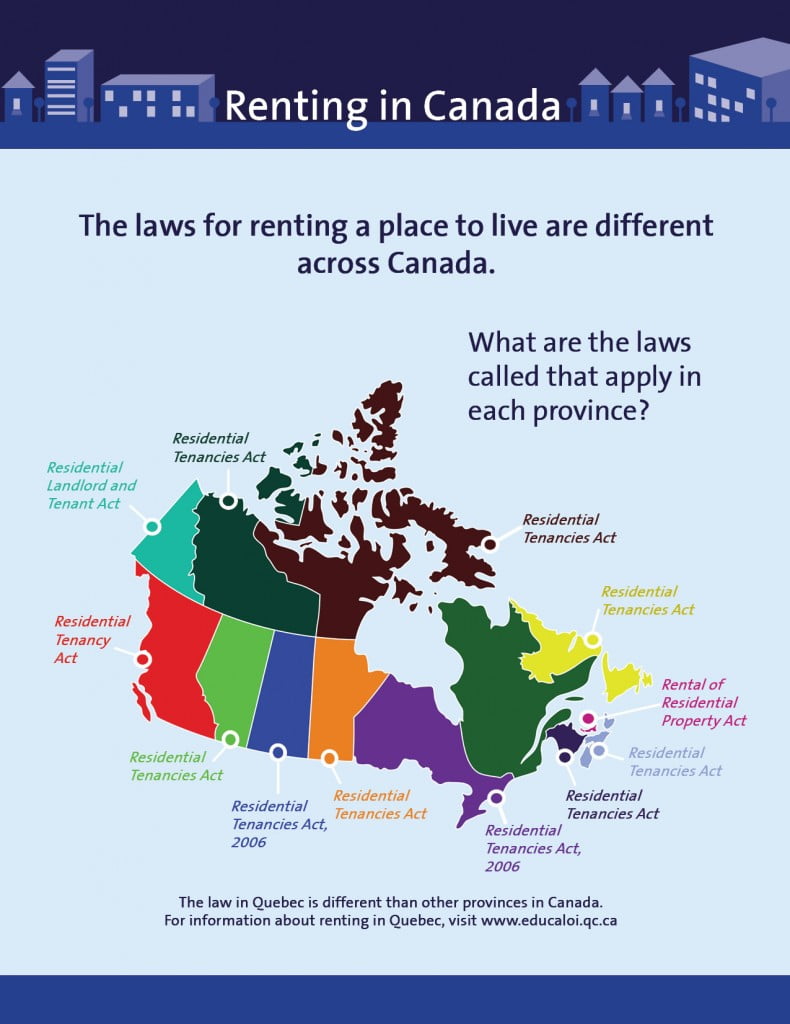



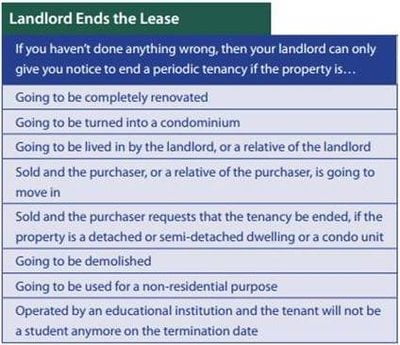
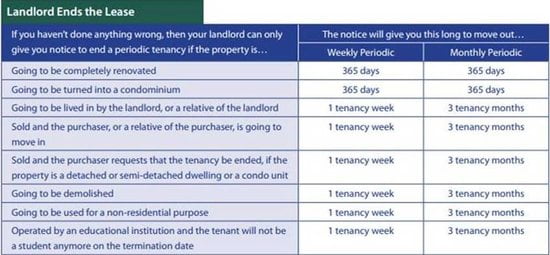















Speak Your Mind Cancel reply